How to Customize Your Herbal Jelly-Mask for Different Skin Types
Unleash your creativity by customizing your own herbal jelly-mask tailored to your skin's unique needs. Explore ingredients, tips, and recipes for a personalized skincare experience.
SKINCAREHERBAL WISDOM
Kathrine-Anne Hill
9/2/20248 min read
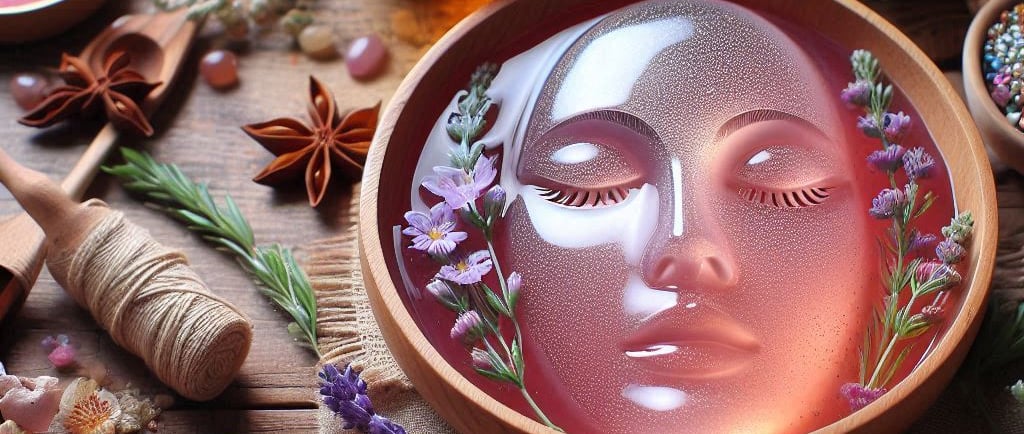

Affiliate Disclaimer:
Please note that some of the links in this article are affiliate links. This means that if you click on these links and make a purchase, I may receive a small commission at no additional cost to you. This commission helps support the maintenance and growth of this website and allows me to continue providing valuable information and recommendations. Rest assured, I only recommend products and services that I have personally used or thoroughly researched. Your support is greatly appreciated! “As an Amazon Associate I earn from qualifying purchases.”
Introduction to Herbal Jelly Masks
The popularity of herbal jelly masks in skincare is due to their many benefits. Unique formulations of these masks are comprised of a blend of natural, plant-based ingredients that are highly concentrated. By forming an inner layer over the skin, this rich and soothing gel allows the deep penetration of multiple nutrients. Herbal jelly masks are an excellent choice for a skincare routine that is designed to be hydrating.
The versatility of herbal jelly masks is one of their most notable features. These masks are capable of being adapted to various skin conditions, making them suitable for many people. Whether you're looking to combat dryness and dullness or look at your skin to reveal more vibrant skin, try the herbal jelly masks that cater to all skin types.
Herbal jelly masks contain high levels of active ingredients, which makes them highly effective. They usually contain botanical extracts, essential oils and other nourishing ingredients known for their health benefits. When combined, they form a concentrated solution that can address specific skin concerns and promote radiance.
The trend of creating customized herbal jelly masks is gaining popularity among beauty enthusiasts and those who practice skincare for different skin types or concerns. You can add different types of herbs to the jelly base and customize your mask.. To help with dry skin, a mask that contains chamomile and aloe vera will soothe your irritations, while combining green tea custard blended with witch hazel can help to alleviate oily skin and prevent breakouts. Next sections will provide a more detailed explanation of the various herbal ingredients that can be used on different skin types, along with instructions on how to properly use these herbal jelly masks.
Herbs and Ingredients for Dry Skin
Dry skin necessitates special attention and care, particularly in terms of hydration and retaining moisture. The inclusion of specific herbs and ingredients renowned for their hydrating qualities can markedly enhance the skin's texture, rendering it more smooth and pliable. Aloe vera, chamomile, and hyaluronic acid are among the pivotal ingredients for this purpose.
Known for its cooling and moisturizing properties, aloe vera is a popular choice. Contains vitamins, antioxidants and anti-inflammatory compounds, this is especially effective for dry skin. The skin takes in a hydrating layer from the gel-like substance, providing relief from dryness and irritation.
A potent ingredient, chamomile is known for its anti-inflammatory and calming effects. Chamomile, an antioxidant-rich plant, is effective in reducing redness, moisturizing the skin, and preventing moisture loss. This product is ideal for dry and irritated skin, providing gentle but effective hydration to sensitive skin.
Hyaluronic acid is renowned for its superior moisture retention, rendering it an extremely potent hydrating agent. Its capacity to hold water up to 1,000 times its weight renders it a crucial component in all-natural skincare formulations. When incorporated into products like herbal jelly masks, hyaluronic acid can keep the skin plump and well-hydrated for extended durations.
Introducing these essential ingredients for creating a nourishing herbal jelly mask that is gentle on dry skin. Start with aloe vera gel and add chamomile essential oil a few drops. Lastly, employ hyaluronic acid serum to enhance the moisture level. The skin will be left feeling fresh and hydrated after being cleansed with this rich, hydrating mask. A carefully selected blend of ingredients can produce a powerful herbal jelly mask, ideal for dry skin, offering superior hydration.
Herbs and Ingredients for Acne-Prone Skin
For individuals with acne-prone skin, using a herbal jelly mask infused with anti-inflammatory and antibacterial herbs can greatly enhance their complexion. It's crucial to select ingredients that not only eliminate bacteria and reduce inflammation but also swiftly and gently soothe swollen, itchy skin.
Tea tree oil is an effective antiseptic, antibacterial, and anti-inflammatory agent that can aid in treating facial acne. It works by targeting sebaceous glands and pores, helping to treat whiteheads, blackheads, and pimples. Due to its high concentration, tea tree oil should be used in moderation, typically a few drops mixed into a mask base.
Salicylic acid, renowned for cleansing the skin, unclogging pores, and diminishing inflammation, is present in willow bark, presenting it as a superb alternative. Salicylic acid excels in enhancing skin texture and clarity by dissolving the follicular wall and eradicating acne. Utilizing a mixture of powders or extracts that include willow bark can help formulate a facial mask that capitalizes on these advantages.
With its high polyphenol content, green tea also provides remarkable antioxidant and anti-inflammatory benefits. These compounds assist in reducing sebum production, which in turn helps to manage acne breakouts. Moreover, green tea benefits skin and is an effective natural moisturizer. Incorporating green tea into a facial mask can be done by steeping the leaves and adding the resulting tea, or by mixing powdered green tea directly into the mask base.
To create a skin-friendly herbal jelly for acne-prone skin, combine a minimal amount of tea tree oil, one teaspoon of willow bark extract or powder, and one tablespoon of green tea or its equivalent in powder form. Blend the ingredients thoroughly and apply the mixture evenly across your face, avoiding the eye area. Allow it to sit for 15-20 minutes before rinsing with lukewarm water.
By using this specially formulated blend, you can achieve the desired outcome of reducing acne and promoting overall skin health. Make sure to test your patch test for any reactions before putting these ingredients on your whole face.
Herbs and Ingredients for Aging Skin
An anti-aging herbal jelly mask is designed specifically for those seeking to maintain a youthful complexion.. Addressing the needs of mature skin involves incorporating ingredients that tighten the skin, diminish fine lines, and boost collagen production. Ginseng, rosehip oil, and vitamin C rank as some of the top components for achieving these results.
Traditional Asian skincare incorporates Ginseng, a well-known ingredient that is known for its ability to increase skin elasticity. Several phytonutrients are present in it, which can activate and stimulate the skin's metabolism and blood flow to help regenerate and firm the surface. Adding ginseng to the jelly mask can help reduce fine lines and boost skin vitality, particularly with dryness on the face.
Rosehip oil is another effective treatment for aging skin. Rich in essential fatty acids such as omega-3 and omega-6, along with vitamins A and C, rosehip oil significantly enhances skin regeneration. It aids in correcting dark spots, hydrating dry and itchy skin, and minimizing scars and fine lines by fostering the renewal of skin tissues and cells. Additionally, the antioxidants present in the oil offer defense against the damaging impact of free radicals.
Vitamin C is a multifaceted nutrient that promotes collagen production, contributing to the skin's firmness and elasticity. It also serves as an antioxidant, aiding in the fight against free radical damage and decelerating the aging process. As a crucial ingredient in herbal jelly masks, Vitamin C can markedly enhance skin firmness and elasticity through its collagen-boosting effects.
To concoct a rejuvenating jelly mask, combine the following ingredients with a base of your choice, like aloe vera gel or an herbal jelly. Incorporate a teaspoon of ginseng extract, a bit of rosehip oil, and a quarter teaspoon of powdered vitamin C into the base. Thoroughly blend all the ingredients until they form a cohesive mixture. Apply the mask evenly across your face and leave it on for 15-20 minutes before rinsing with lukewarm water. With regular use, this personalized jelly mask can lead to noticeable improvements in skin firmness, diminished fine lines, and enhanced overall skin health.
Step-by-Step Customization Guide
Creating an effective herbal jelly mask tailored to various skin types requires a careful selection of ingredients and precise techniques. The first step involves preparing the base. Typically, a base of aloe vera gel or rose water is recommended, as it provides hydration and calms the skin. For one mask, begin with about 2 tablespoons of your chosen base.
Next, incorporate the active herbal ingredients. For dry skin, consider adding a teaspoon of honey and a few drops of chamomile or lavender essential oil. These components are known for their moisturizing and soothing properties. If your skin is oily, counteract the excess oil by adding a teaspoon of green tea extract and a few drops of tea tree oil, which helps reduce excess sebum and improve acne.
For individuals with sensitive skin, selecting gentle ingredients is crucial. Mixing a teaspoon of calendula extract with a few drops of rosehip oil can be highly beneficial. These elements help to diminish inflammation and redness. Those with normal skin types might find a balanced regimen advantageous. Combining one teaspoon of cucumber extract with a few drops of jasmine oil can sustain overall skin health and offer nourishing advantages.
Once you have added your chosen ingredients, mixing them thoroughly ensures an even consistency. Use a small whisk or fork to blend the ingredients together until you achieve a smooth texture, similar to a pudding. This consistency ensures that the mask spreads evenly over the skin.
Application techniques are just as essential as the ingredients themselves. Apply the mask using clean fingers or a mask brush, spreading an even layer over your face, avoiding the eyes and lips. Allow the mask to sit for about 15-20 minutes. This time allows the ingredients to soak into the skin fully. Afterward, rinse off the mask with lukewarm water and pat your skin dry with a clean towel.
By customizing the herbal jelly mask to cater to different skin types, you can maximize the benefits and achieve healthier, more radiant skin. This step-by-step guide provides all the necessary instructions to create a mask that suits your skin’s unique needs.
Additional Tips and Precautions
Tailoring herbal jelly masks to various skin types involves choosing appropriate ingredients and adhering to specific tips and precautions to enhance their benefits. The storage of these masks is vital; it's advisable to place the prepared mask into a sealed container and refrigerate it. This practice not only maintains the mask's freshness and efficacy but also imparts a refreshing sensation that can calm the skin.
Consistency and patience are key when incorporating these customized herbal jelly masks into your skincare routine. For optimal results, masks should generally be applied 2-3 times a week. Overuse, however, can lead to skin irritation or dryness, especially for those with sensitive skin. Before applying the mask to your face, always perform a patch test. Apply a small amount of the mask on your inner arm and wait for 24 hours to check for any adverse reactions. This helps in identifying any ingredient that may cause allergies or irritation.
The potential side effects of skincare products can differ based on various skin types and personal sensitivities. For instance, individuals with dry skin might need to be wary of masks that include astringent or detoxifying herbs, which could further dry out their skin. On the other hand, those with oily skin might find that certain moisturizing herbs are too rich, potentially causing blocked pores and acne. It's crucial to observe your skin's response to different masks and tailor the ingredients to suit your needs.
Lastly, it is important to remember that herbal jelly masks are complementary to, not replacements for, a comprehensive skincare routine. Ensure that you are cleansing, toning, and moisturizing your skin regularly. By adhering to these tips and precautions, you can effectively utilize customized herbal jelly masks to enhance your skincare regimen while minimizing potential risks.
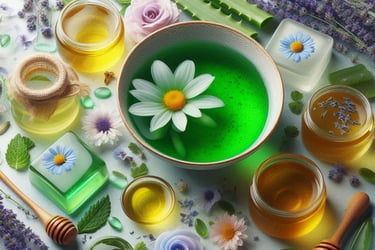

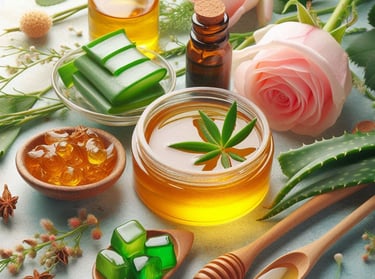

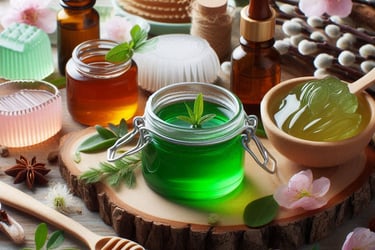

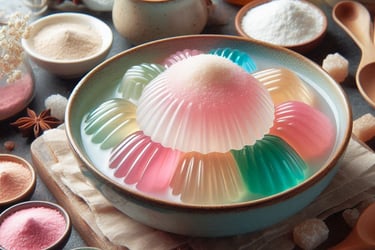

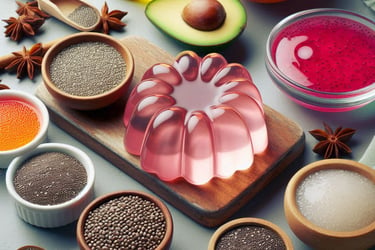

Related Posts:

